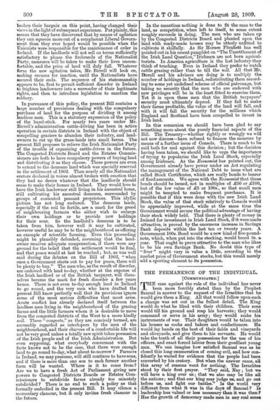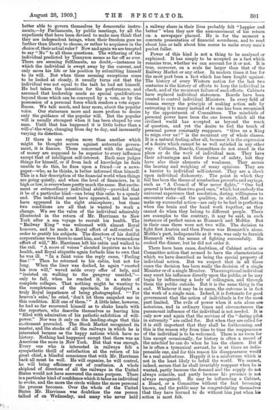THE case against the rule of the individual has never been
more forcibly stated than by the Prophet Samuel in answer to the request of the Israelites that he would give them a King. All that would follow upon such a change was set out in the fullest detaiL The King would do what he liked with their children. Their sons would till his ground and reap his harvests ; they would command or serve in his army; they would make his instruments of war. Their daughters would be taken into his houses as cooks and bakers and confectioners. He would lay hands on the best of their fields and vineyards and oliveyards, and give theta to his servants. He would take the tenth of all their possessions for the use of his officers, and exact forced labour from their goodliest young men. We can imagine how satisfied Samuel was as he closed this long enumeration of coming evil, and how con- fidently he waited for evidence that the people had been converted by his oratory. But when the answer came, all this array of reasons went for nothing. The Israelites stood by their first prayer. "They said, Nay ; but we will have a, ling over us ; that we also may be like all the nations ; and that -our king may judge us, and go out before us, and fight our battles?' Is the world very different from what it was in the days of Samuel ? Is leadership less valued or less necessary than it was then? Has the growth of democracy made men in any real sense letter able to govern themselves by democratic instru- ments,—by Parliaments, by public meetings, by _ all the expedients that have been devised to make men think that they are independent beings, when their freedom goes no further than liberty to choose, or rather to acquiesce in the choice of, their actual ruler ? Now and. again we are tempted to say " No " to all these questions. The withering of the individual predicted by Tennyson seems as far off as ever. There are seeming fulffiments, no doubt—instances in which the individual is swept away by the current, and only saves his life or his position by submitting himself to its will. But when these seeming exceptions come to be looked at closely, it usually turns out that the individual was not equal to the task he had set himself. He had taken the intention for the performance, and assumed that leadership needs no special qualifications beyond those which can be conveyed by a vote, or by the possession of a personal force which renders a vote super- fluous. We talk much, and hear more, about the popular voice. Our statesmen more and more profess to desire only the guidance of the popular will. But the popular will is usually strongest when it has been shaped by one man. Until that has happened it is little better than a will-o'-the-wisp, changing from day to day, and. incessantly varying its direction.
If there is one region more than another which might be thought secure against autocratic govern- ment, it is finance. Those concerned with the making of money are supposed to be superior to every influence except that of intelligent self-interest. Each man judges things for himself, or if from lack of knowledge he feels unable to do this, he fixes upon a friend—or a news- paper—who, as he thinks, is better informed than himself. This is a fair description of the financial world when things are going quietly, and when the level of financiers, be it high or low, is everywhere pretty much the same. But excite- ment or extraordinary individual ability—provided, that it be of a particular End—can bring this calm to a speedy end. The individual must have appeared, and he must have appeared in the right atmosphere ; but these two conditions are all that is wanted to work a change. We see the value of the individual admirably illustrated, in the return of Mr. Harriman to New York after a sea voyage to recruit his health. The "Railway King" was welcomed with almost Royal honours, and he made a Royal effort of self-control in order to gratify his subjects. The directors of his dutiful corporations were there to meet him, and, "by a tremendous effort of will," Mr. Harriman left his cabin and walked to the rail. "A score of voices" shouted inquiries as to his health, and Royal etiquette again forbade him to own that he was ill. "In a faint voice the reply came, 'Feeling fine ! " Then he returned to his cabin, but not for long. When the liner was docked, he again "exerted his iron will," waved aside every offer of help, and "insisted on walki a to the gangway unaided,"— only to fall, when L'he reached it, in a, state of complete collapse. That nothing might be wanting to the completeness of the spectacle, he displayed a truly Royal impatience of being photographed. " For heaven's sake,' he cried, 'don't let them snapshot me in this condition. Kill one of them?" A little later, however, he had so far recovered himself as to shake hands with the reporters, who describe themselves as leaving him `‘` filled with admiration of his pathetic exhibition of will- power." Nor was it only on the landing-stage that this excitement prevailed. The Stock Market recognised its master, and the stocks of all the railways in which he is interested became as the happy nations which have no history. Nothing had happened except that there was an American the more in New York. But that was enough. Every one who is interested in railways felt a sympathetic thrill of satisfaction at the return of his great chief, a blissful conscience that with Mr. Harriman back all must be well. He will organise, he will control, he will bring efficiency out of confusion. A whole shipload of directors of all the railways in the 'United States would_ not have answered the same purpose. There is a particular kind of confidence which it takes an individual to evoke, and the more. the circle widens the more personal the process becomes. Over the whole of the 'United States Mr. Harriman was doirbtless. the one person talked of on Wednesday, and many who never held a railway share in their lives probably felt "happier and better" when they saw the announcement of his return on. a newspaper placard. He is for the moment a concrete presentation of financial soundness, and to read about him or talk about him seems to make every man's pocket fuller.
Power of this kind is not a thing to be analysed or explained. It has simply to be accepted as a fact which remains true, whether we can account for it or not. It is true, moreover, on a scale far larger than that of the Railway Market or any other. In modern times it has for the most part been a fact which has been fought against. The history of every Western nation for the last two centuries is the history of efforts to keep the individual in check, and of the recurrent failure of such efforts. Cabinets have replaced individual statesmen. Boards have been created to control individual Ministers. In every field of human energy the principle of making action safe by entrusting it to many instead of to one has been recognised by the appointment of Committees. The mischiefs of personal power have been the one lesson which all the civilised world has accepted as beyond the reach of question, and yet the desire to feel the touch of personal power constantly reappears. "Give us a King to reign over us ! " is the recurrent cry of whole classes. It is a natural feeling, after all, because it is the expression of a desire which cannot be as well satisfied in any other way. Cabinets, Boards, Committees do not stand in the place or do the work of individual men. They have their advantages and their forms of safety, but they have also their elements of weakness. They secure the hearing and weighing of many opinions. They are a barrier to individual self-interest. They are a check upon individual dishonesty. The point in which they fail has been the theme of numberless proverbs and sayings, such as "A Council of War never fights," "One bad general is better than two good ones," which but embody the universal experience that resolution, daring, willingness to encounter risks—all the qualities, in short, that go to make up successful action—are only to be had in perfection when the brain and the hand work together, as they cannot do when they belong to different people. Thera are examples to the contrary, it may be said, in such instances of perfect union as Bismarck and Moltke. But in their case there were not two wills. The decision to fight first Austria and then France was Bisma,rek's alone. Moltke's part, indispensable as it was, was only to furnish Bismarck with the means of fighting successfully. He cooked the dinner, but he did not order it.
There have been cases, doubtless, of Cabinet action or Committee action that seemed to have the characteristics which we have described as being the special property of individual action. But we suspect that in all these cases the decision has been really the decision of a single Minister or of a single Member. The exceptional individual may exert his influence directly upon the public, or he may begin by influencing a body of colleagues, and through them the public outside. But it is the same thing in the end. Whatever it may be in name, the outcome is in fact the work of a single man. Indeed, it is fortunate for good government that the action of individuals is for the most part limited. The evils of power when it acts alone area notorious, And in ordinary times and circumstances the paramount influence of the individual is not needed. It is only now and again that the services of the "daring pilot. in extremity" are called for. But when they are called for it is still important that they shall be forthcoming, and this is the reason why from time to time the reappearance of the individual is to be welcomed. There is no room for him except occasionally, for history is often a record of the mischief he can do when he has the chance. But if he is often a tyrannical servant, he is at times an indis- pensable one, and for this reason his disappearance would be a real misfortune. Happily it is a misfortune which is not in the least likely to befall the world. We cannot. indeed, secure that he shall invariably reappear when he is wanted, partly because the demand and the supply do not always coincide, and partly because hi3 presence is. not always recognised. He may be influencing a Cabinet, a Board, or a Committee without the fact becoming brown, and the public may be congratulating themselves that they have learned to do without him just when his action is most felt.







































 Previous page
Previous page